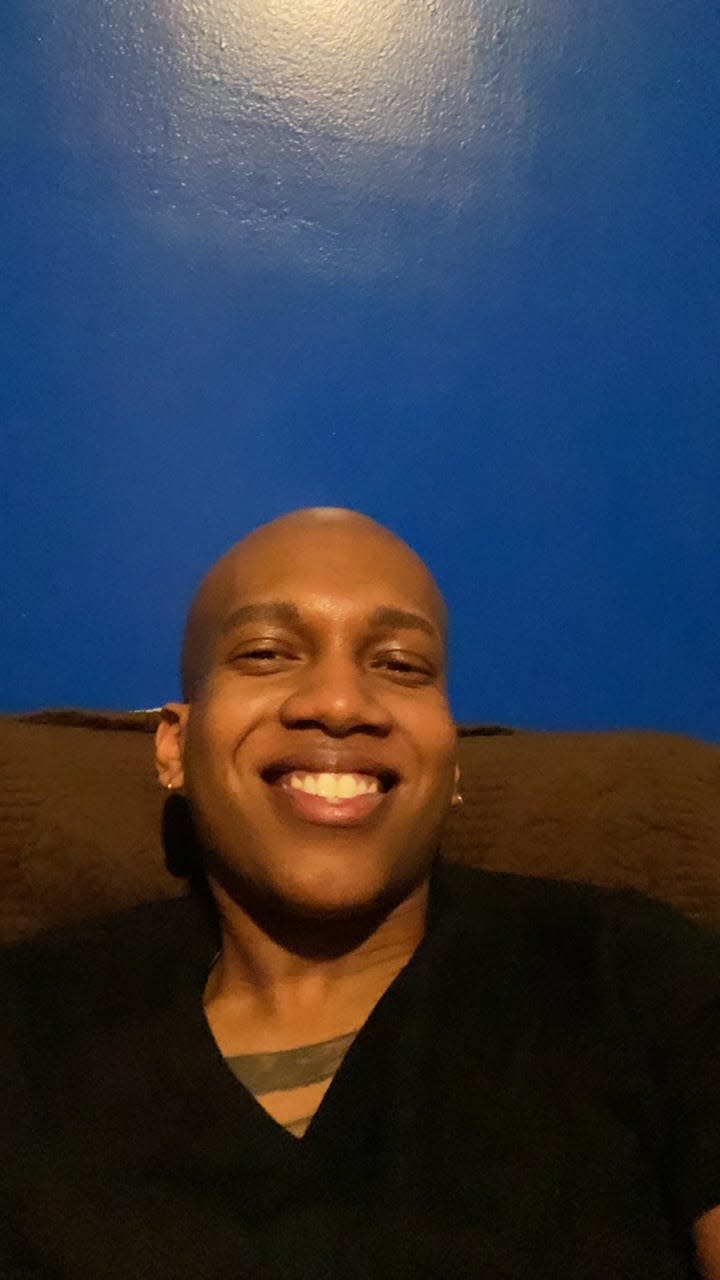For decades, people with severe alopecia areata had no approved treatment options. Until now.
- Oops!Something went wrong.Please try again later.
- Oops!Something went wrong.Please try again later.
For Christian Daniels, it started when his co-worker pointed out a dime-sized bald patch on the back of his head.
Within days, he was waking up each morning to find clumps of hair on his white pillowcase.
A month later it was all gone. The hair on his head, his eyebrows, eyelashes. Even the hairs in his nose.
At 25, Daniels was diagnosed with alopecia areata, an autoimmune disorder that causes hair loss. Doctors had few treatment options to offer him.
“That's the worst part. When you Google alopecia, you see there’s no treatment and no cure for it,” said Daniels, now 27, of Peoria, Arizona. “That hit me pretty hard.”
But that's set to change, giving hope not only to Daniels but to an estimated 7 million other Americans living with the life-altering condition.

This week, the Food and Drug Administration approved what experts are calling a groundbreaking treatment for severe alopecia areata, making it the first and only medication on the market approved for the skin disease.
“It’s life-changing,” said Dr. Crystal Aguh, a board-certified dermatologist and associate professor of dermatology at the Johns Hopkins School of Medicine. “It’s the first major breakthrough we’ve had in alopecia areata in the last 20 years.”
The drug, Olumiant, made by pharmaceutical companies Eli Lilly and Incyte, is a once-daily pill for adult patients with at least 50% head hair loss.
In a trial of about 1,200 patients, researchers found about 22% of those who took 2 milligrams of the drug, and 35% of those who took 4 milligrams saw 80% or more scalp coverage after nine months.
About 13% of patients who took the higher dose reported hair regrowth of 90% or more, according to data released by Eli Lilly.
“For all of history, there has been nothing this effective,” said Dr. Brett King, lead investigator of the clinical trials and associate professor of dermatology at Yale School of Medicine. “It’s truly historic and transformative – both literally and figuratively.”
Alopecia is a medical term to describe general hair loss. The condition gained more awareness after Jada Pinkett Smith spoke about it on an episode of her Facebook show “Red Table Talk,” detailing her experience with hair loss.
It’s unclear if Pinkett Smith has alopecia areata, which is a specific skin disorder that causes the body’s immune system to attack hair follicles. It’s distinguished by circular patches of hair loss and can result in a complete loss of scalp hair, eyebrows, eyelashes, facial hair and body hair.
Breaking the silence: Jada Pinkett Smith addresses Chris Rock's Oscars comments in 'Red Table Talk' about alopecia
The aftermath: Will Smith blocked from Academy events for 10 years, Board of Governors decides after slap
Prior to Olumiant, no drug was specifically approved by the FDA for alopecia areata. The traditional treatment has been monthly steroid injections. Studies have shown in most cases, people regrow some of their hair, but the gains are typically lost if patients discontinue treatment, as many do because the shots directly into bald spots are painful.
Patients with extensive hair loss also have been given off-label immunosuppressants, Aguh said, but the treatment is not very effective and often comes with many side effects.
Olumiant belongs to a class of drugs called JAK inhibitors and was originally approved for rheumatoid arthritis.
Instead of suppressing the entire immune system, like immunosuppressants, JAK inhibitors focus on the immune cells attacking the hair follicles, explained Dr. Paradi Mirmirani, a hair disorder specialist and faculty at the American Academy of Dermatology.

“With this medication, it’s more targeted,” she said. “It’s disabling the communication mechanism that promotes that continual attack on hair follicles.”
Some dermatologists have tried to prescribe the medication off-label but got pushback.
“Anytime I attempted to prescribe JAK inhibitors in routine care, I could never get insurance coverage for it,” said Dr. Laura Ferris, a dermatologist and professor of dermatology at the University of Pittsburgh School of Medicine.
Aguh said it used to take “a lot of begging” to get insurance companies to pay for the drug. But now with FDA approval, they’re more likely to comply.
Still, the price tag for Olumiant is high. The list price for a month’s supply of the 2-milligram Olumiant pills is nearly $2,500, Eli Lilly said. The 4-milligram pills are nearly $5,000 for a month’s supply.
Since JAK inhibitors are relatively new to the drug market and even newer to alopecia areata, health experts are unsure how long patients will need to take Olumiant and if results will last after they stop taking it. But as trials continue, King's optimism is fueled by continued hair growth.
Daniels was able to gain access to the drug without the exorbitant price tag by enrolling in King's clinical trial in February 2020. The trial is ongoing and he’s still blinded, which means he doesn’t know if he’s taking Olumiant or the placebo, but he’s ecstatic about the results.
“I have a full head of hair now,” he exclaimed. “You wouldn’t know that I have alopecia looking at me now.”

Within eight months, his hair, eyebrows, eyelashes and nose hairs were back. He even grew a beard, something he never had before.
The only side effects he experienced were mild acne and headaches. It’s a small price to pay for his life back, he said.
Daniels no longer needs to answer questions about his condition or rub Vaseline on his lash-free eyes to protect them. He can go back to his barber and get his usual fade, instead of asking him to hide bald patches.
“My quality of life has changed dramatically. I want to be upfront and center instead of in the shadows somewhere hiding,” he said. “I feel like the Christian that I was before alopecia.”
Follow Adrianna Rodriguez on Twitter: @AdriannaUSAT.
Health and patient safety coverage at USA TODAY is made possible in part by a grant from the Masimo Foundation for Ethics, Innovation and Competition in Healthcare. The Masimo Foundation does not provide editorial input.
This article originally appeared on USA TODAY: Alopecia areata: FDA approves 'life changing' treatment, Olumiant

